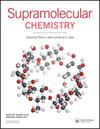超分子主客体电化学的应用方向
IF 2.6
4区 化学
Q3 CHEMISTRY, MULTIDISCIPLINARY
引用次数: 0
摘要
从广义上讲,超分子化学是对非共价相互作用的研究。电化学本质上涉及离子和溶剂的超分子组织,因此利用超分子化学可以解决电化学问题。本文章由计算机程序翻译,如有差异,请以英文原文为准。
Towards applications of supramolecular host–guest electrochemistry
Supramolecular chemistry is, broadly, the study of noncovalent interactions. Electrochemistry inherently involves supramolecular organisation of ions and solvent, so the use of supramolecular chemi...
求助全文
通过发布文献求助,成功后即可免费获取论文全文。
去求助
来源期刊

Supramolecular Chemistry
化学-化学综合
CiteScore
3.60
自引率
3.00%
发文量
5
审稿时长
2.7 months
期刊介绍:
Supramolecular Chemistry welcomes manuscripts from the fields and sub-disciplines related to supramolecular chemistry and non-covalent interactions. From host-guest chemistry, self-assembly and systems chemistry, through materials chemistry and biochemical systems, we interpret supramolecular chemistry in the broadest possible sense. Interdisciplinary manuscripts are particularly encouraged. Manuscript types include: high priority communications; full papers; reviews, and; Methods papers, techniques tutorials highlighting procedures and technologies that are important to the field. We aim to publish papers in a timely fashion and as soon as a paper has been accepted and typeset it will be published in electronic form on the Latest articles section of the website. The two most important review criteria are that the paper presents high-quality work that fits generally into the broad spectrum of activities in the supramolecular chemistry field. Under normal circumstances, Supramolecular Chemistry does not consider manuscripts that would be more suitable in a highly specialized journal. This includes, but is not limited to, those based mostly or exclusively on topics such as solid state/X-ray structures, computational chemistry, or electrochemistry. .
The two most important review criteria are that the paper presents high-quality work that fits generally into the broad spectrum of activities in the supramolecular chemistry field.
 求助内容:
求助内容: 应助结果提醒方式:
应助结果提醒方式:


